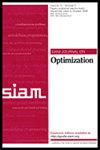基于共识的优化方法全球趋同
IF 2.3
1区 数学
Q1 MATHEMATICS, APPLIED
引用次数: 0
摘要
SIAM 优化期刊》,第 34 卷第 3 期,第 2973-3004 页,2024 年 9 月。 摘要本文研究了基于共识的优化(CBO),它是一种多代理元启发式无导数优化方法,可以全局最小化非凸非光滑函数,并易于理论分析。基于实验支持的直觉,即平均而言,CBO 执行的是到全局最小值的欧氏距离平方的梯度下降,我们设计了一种新技术,以证明对于丰富的目标函数类别,CBO 在均值场法中收敛到全局最小值。这一结果揭示了 CBO 的内部机制,这些机制是该方法成功的原因。特别是,我们证明了当优化代理的数量达到无穷大时,CBO 对一大类优化问题进行了凸化。此外,我们还改进了之前的分析,对方法的初始化提出了温和的假设,并涵盖了仅局部利普齐兹连续的目标。作为本分析的核心部分,我们建立了一个定量的非渐近拉普拉斯原理,这可能会引起独立的兴趣。从均值场法的 CBO 收敛结果可以看出,任何全局优化问题的难易程度都必然包含在均值场近似率中,我们为此提供了一种新的概率定量估计。结合这些结果,我们可以获得数值 CBO 方法的概率全局收敛保证。本文章由计算机程序翻译,如有差异,请以英文原文为准。
Consensus-Based Optimization Methods Converge Globally
SIAM Journal on Optimization, Volume 34, Issue 3, Page 2973-3004, September 2024.
Abstract. In this paper we study consensus-based optimization (CBO), which is a multiagent metaheuristic derivative-free optimization method that can globally minimize nonconvex nonsmooth functions and is amenable to theoretical analysis. Based on an experimentally supported intuition that, on average, CBO performs a gradient descent of the squared Euclidean distance to the global minimizer, we devise a novel technique for proving the convergence to the global minimizer in mean-field law for a rich class of objective functions. The result unveils internal mechanisms of CBO that are responsible for the success of the method. In particular, we prove that CBO performs a convexification of a large class of optimization problems as the number of optimizing agents goes to infinity. Furthermore, we improve prior analyses by requiring mild assumptions about the initialization of the method and by covering objectives that are merely locally Lipschitz continuous. As a core component of this analysis, we establish a quantitative nonasymptotic Laplace principle, which may be of independent interest. From the result of CBO convergence in mean-field law, it becomes apparent that the hardness of any global optimization problem is necessarily encoded in the rate of the mean-field approximation, for which we provide a novel probabilistic quantitative estimate. The combination of these results allows us to obtain probabilistic global convergence guarantees of the numerical CBO method.
Abstract. In this paper we study consensus-based optimization (CBO), which is a multiagent metaheuristic derivative-free optimization method that can globally minimize nonconvex nonsmooth functions and is amenable to theoretical analysis. Based on an experimentally supported intuition that, on average, CBO performs a gradient descent of the squared Euclidean distance to the global minimizer, we devise a novel technique for proving the convergence to the global minimizer in mean-field law for a rich class of objective functions. The result unveils internal mechanisms of CBO that are responsible for the success of the method. In particular, we prove that CBO performs a convexification of a large class of optimization problems as the number of optimizing agents goes to infinity. Furthermore, we improve prior analyses by requiring mild assumptions about the initialization of the method and by covering objectives that are merely locally Lipschitz continuous. As a core component of this analysis, we establish a quantitative nonasymptotic Laplace principle, which may be of independent interest. From the result of CBO convergence in mean-field law, it becomes apparent that the hardness of any global optimization problem is necessarily encoded in the rate of the mean-field approximation, for which we provide a novel probabilistic quantitative estimate. The combination of these results allows us to obtain probabilistic global convergence guarantees of the numerical CBO method.
求助全文
通过发布文献求助,成功后即可免费获取论文全文。
去求助
来源期刊

SIAM Journal on Optimization
数学-应用数学
CiteScore
5.30
自引率
9.70%
发文量
101
审稿时长
6-12 weeks
期刊介绍:
The SIAM Journal on Optimization contains research articles on the theory and practice of optimization. The areas addressed include linear and quadratic programming, convex programming, nonlinear programming, complementarity problems, stochastic optimization, combinatorial optimization, integer programming, and convex, nonsmooth and variational analysis. Contributions may emphasize optimization theory, algorithms, software, computational practice, applications, or the links between these subjects.
 求助内容:
求助内容: 应助结果提醒方式:
应助结果提醒方式:


